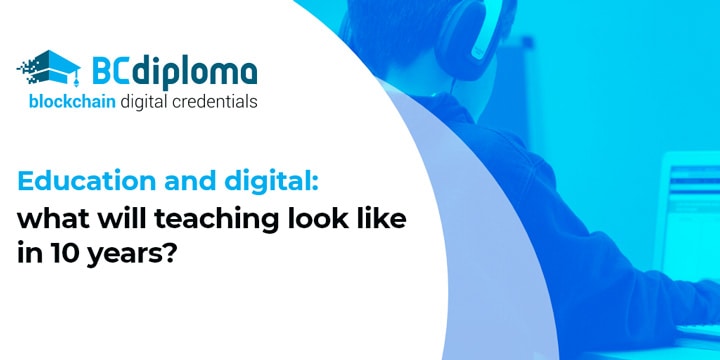The health measures implemented in response to the pandemic have reshaped education around the world. While several years would have been necessary to activate the digitization of education, the new technologies have been hastily foisted on faculty and students. Video courses, MOOCs and e-learning have been widely adopted and today it seems difficult to do without them. More flexible, more practical and less costly, will these new teaching practices last? Will online schooling be the new standard? How will new technologies revolutionize tomorrow’s education?
In the future, education will be accessible to everyone through digital technology
Current inequalities in education access in a few figures
“Ensure inclusive and equitable quality education and promote lifelong learning opportunities for all” is the 4th Sustainable Development Goal according to the 2030 Agenda for Sustainable Development stated in September 2015, during the United Nations Sustainable Development Summit. Today, we are still far from it:
- In the Organisation for Economic Co-operation and Development (OECD) countries, 8% of children and youth do not attend secondary school;
- Worldwide, more than 260M children and youth were out of school in 2018. That’s one in five young people!
- Only a quarter of children in developing countries leave secondary school with basic skills;
- In France, 32% of adults participate in work-related training, compared to 41% on average in OECD countries;
- Only 12.3% of job seekers in France have gone through training.

E-learning: the solution to enable education for everyone?
E-learning is a distance learning method that uses the Internet and new technologies. It allows students to learn wherever they are, whenever they want, and to have access to much more content than traditional courses offer.
Why does e-learning promote learning for all?
- A much more affordable price than traditional training;
- A more varied and updated course offering in line with the job market;
- Training courses to acquire digital skills, now in demand by companies, such as mastering data, coding or artificial intelligence.
E-learning is a revolutionary tool that promotes career change and continuous training in companies. In ten years, it will be legitimate, and generalized from the career change phase to graduation. With e-learning, we can hope that people who are currently outside the education system will be fully integrated into it in the future: job seekers, poorly qualified people, people with disabilities, refugees, etc. E-learning platforms such as OpenClassroom are already available and offer a glimpse of the bright future that this new type of learning could offer once it becomes widespread: diploma and vocational training courses, accreditations, training for the skills required by companies and a tutor who follows the progress of each student regularly.

The success of e-learning will depend on the right balance between distance and face-to-face learning: how to combine the advantages of distance learning with the benefits of face-to-face training (exchanges, debates, teamwork, etc.)?
Learning will be personalized, adaptive and competency-based
Adaptive learning: the future of training?
In 2019, 80,000 young French people left the school system without a diploma or qualification. Why? Because the current educational system is not adapted to the majority of students.
Adaptive learning is a new teaching practice offering personalized learning to each student using digital technology. Artificial intelligence would make it possible to have a “teacher” for each student, to adapt to his/her learning pace, abilities and needs using the data collected.
This ultra-personalized educational tool will revolutionize teaching: for formal sciences such as mathematics, reading and languages, the teacher will adapt the support of the student according to the results of his/her progress. The role of teachers will also remain key for subjects that require argumentation, critical thinking, and writing and thinking skills. Indeed, Indeed, algorithms, however perfect they may be, cannot replace a human being.
Soft skills development will be at the core of the learning process
With the widespread use of online courses, students will be able to take basic courses remotely and at their own pace. Classroom courses can be focused on developing students’ soft skills, which are becoming more and more important in society. Already in 2020, according to a Skill Survey, 77% of employers believe that soft skills are more important than hard skills.
Classroom time can be dedicated to group work, discussions, debates and personal projects. The goal is to develop students’ soft skills such as communication, collaboration, creativity, leadership, critical thinking, problem-solving, negotiation, adaptability, curiosity, etc. These skills cannot be learned through traditional courses and yet are fundamental in professional life.
Developing and enabling certification of skills in schools also allows for personalized education. Each student will be able to develop his/her own skills to stand out and build his/her career path.
The competency-based approach is still in its early stages, but it will be an essential educational tool to help students find their way into the workforce.
From classrooms to diplomas: technology will be fully integrated into tomorrow’s school system
Virtual classrooms?
The school of tomorrow will be digital. Technologies have already revolutionized several sectors of our society (banking, catering, etc.) and although education is a sector less prone to digital transformation, we can imagine that in ten years, the entire educational system will be organized around new technologies, starting with classrooms.

Here is how tomorrow’s digital school can be imagined:
- Educational video games like PowerZ to make learning more interactive and motivate students;
- Augmented reality in the classroom to make lessons more dynamic with, for example, virtual dissections to understand how the frog’s body works;
- Chatbots to meet students’ urgent needs and offer quick feedback when working from home;
- Interactive screens and connected tables to facilitate team projects.
The health crisis has made us realize something essential: technology and distance learning cannot replace the school we know. Tomorrow’s classroom may be digital, but the benefits of artificial intelligence, video lectures and other technologies will serve primarily as teaching tools for teachers. Emotional and social intelligence will remain crucial to students’ personal development.
Secure, tamper-proof and permanent diplomas using blockchain
Diploma fraud is a challenge for training institutions and recruiters. In ten years, it will be impossible to lie or cheat on your diploma or resume. The skills highlighted by the students will also be securely certified using the blockchain for education. The blockchain is a technology that, if it becomes widespread, will make accreditations verifiable, transferable, unfalsifiable, and future-proof anywhere in the world and all educational institutions. Each student will be able to share their digital credentials with proof of acquisition for recruiters and keep track of them throughout their lives. The traceability of accreditations enabled by the blockchain will enable lifelong learning.
BCdiploma: 100% blockchain diplomas and micro-certifications
BCdiploma offers blockchain-based digital diplomas, certificates, open badges and micro credentials. Through a dedicated platform, training professionals can create, issue and manage tamper-proof, verifiable and secure certifications. More reliable, more effective and more authentic, BCdiploma certifications are the innovation towards tomorrow’s digital school.
For more information:
https://www.oecd.org/education/skills-beyond-school/42241931.pdf
